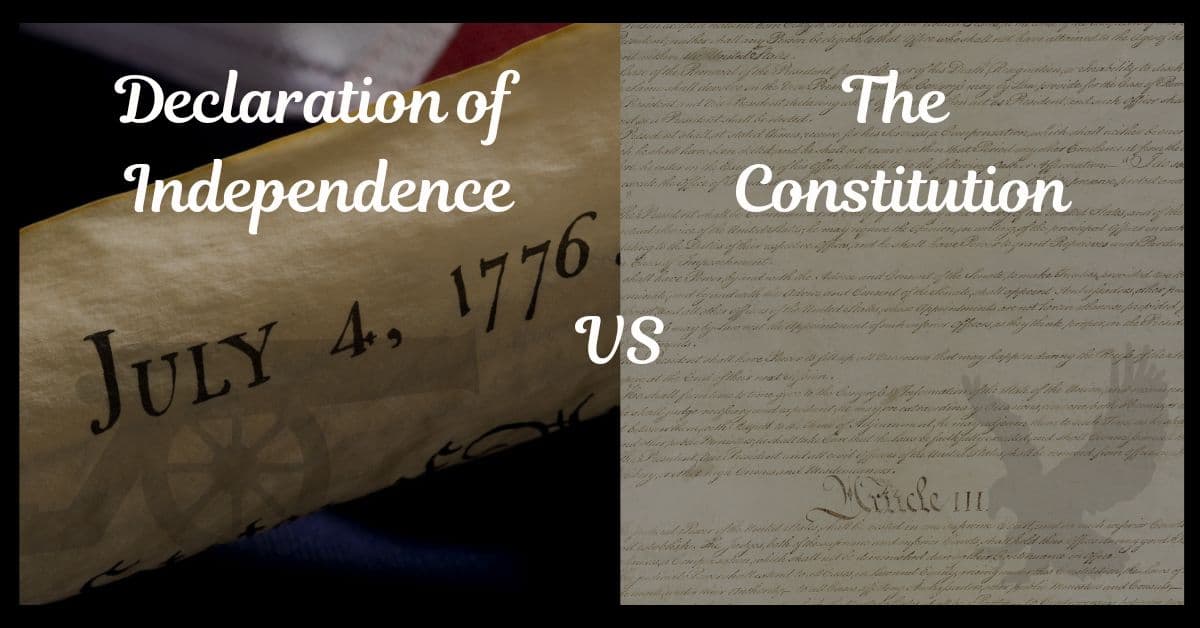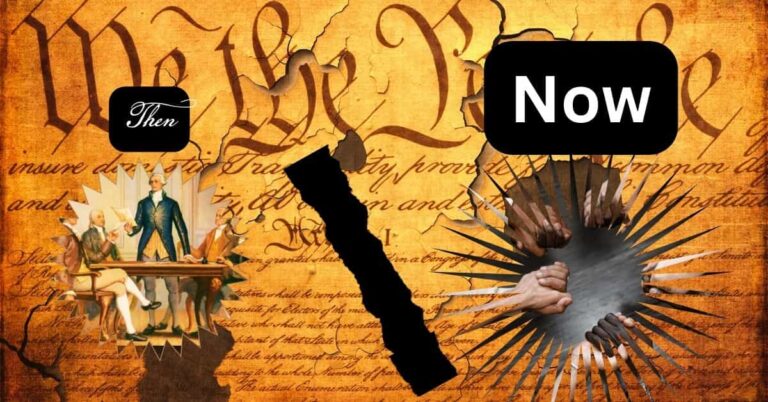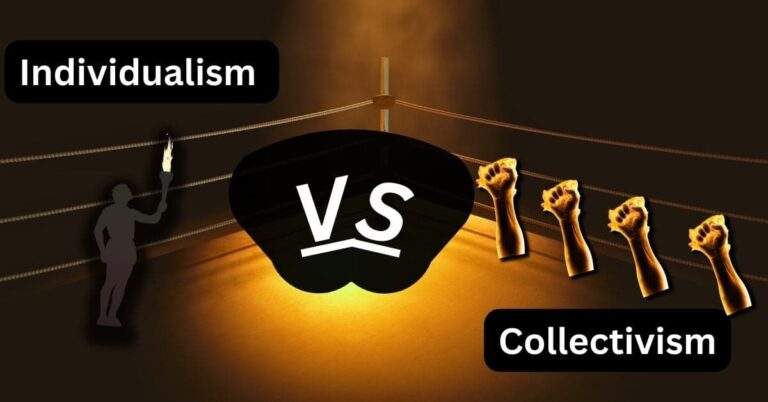You quote a phrase to someone trying to appear smart but then realize, “Oh dang, it is the other document- not the one I thought.” Quickly, you realize your mistake and take immediate action to fix your miscalculation. If that is you, you have come to the right place.
The Declaration of Independence guaranteed the right of American Colonists to seek independence from the British Crown. Jefferson included a list of injustices confirming the need for separation. The Constitution is the governing document determining how the U.S. Government operates.
With your basic understanding of these 2 documents, I know you have more questions. Read further to tame your curiosity and unearth amazing facts about these historical works of art.
Reasons for Writing Both Documents
Which One is More Important?
Declaration of Independence or the Constitution?
I know that is a tough question, but we must look at which document has more influence over the other.
The answer is the Declaration of Independence (The Declaration for short).
For one, the Declaration (June 1776) was penned before the Constitution (1787). First, you must have freedom from an oppressive regime before you can begin a new government and way of life.
Each step along the American struggle for liberty fits into an order of importance that occurred at the exact time needed. The result became a supernova called the U.S.
The Declaration provided the foundational political theory for American Government. We have inalienable rights not granted by the King of Great Britain. Americans tried, begged, and requested that the King honor their grievances and rights but no compromises were ever made.
Thus, the Second Continental Congress ratified the Declaration of Independence on July 4th, 1776, establishing the future political foundation and governance system in the United States of America.
The Foundation of the Declaration of Independence
Here we will explore the founding and the political atmosphere that built the Declaration of Independence.
Atmosphere of Creation

When you read the Declaration
of Independence, you feel the following emotions:
- Rejection
- Fear
- Pain
- Concern
We are supposed to have “life, liberty, and the pursuit of happiness.” Great Britain didn’t support those ideals while in power. They made living in 1776 America like living in hell.
You heard the drums of war beating louder and louder. This terrified the colonists making them wonder what was going to happen next. Who knew when and where Great Britain would take revenge for disobeying?
Meanwhile, messengers read a Declaration of Independence to masses of people igniting an emotional zeal for colonists to tear away from Great Britain.
Imagine if photographs of the American Revolution existed. You would be able to see the emotions of the scared American Patriots.
Sadly, we only have paintings and journals from the 18th century to recreate the feelings of the era.
We can make the following assumptions:
- Turbulent times existed
- Brave Patriots existed
- Scared Patriots existed
- And war is hell
The Declaration needed to be written. It declared to the world that the United States would not sit back and accept Great Britain’s tyrannical rein anymore.
What does the Declaration represent?
In the Declaration of Independence, there are 2 fundamental principles:
- Government is established for the security of rights
- A government must have the people’s consent
The Declaration committed the U.S to a Republican form of government. To succeed as a new nation, the Founders decided on a representative government with an assembly of representatives- not a direct democracy.
Direct Democracies don’t secure the fundamental rights of citizens. Mobs are too emotional to worry about the accepted rights of people if they hinder the collective goal.
Overall, the Declaration of Independence is a liberal document sparking an armed rebellion against established authority.
It created a precedent and future goals for the U.S.
Here is a list of other meanings and representations of the Declaration of Independence:
- Declared an ending to British influence (threw off the British government)
- Defined rules for future government
- Listed important ideals necessary in society
The Foundation of the Constitution
Here we will explore the secrets and political foundations of the Constitution.
Atmosphere of Creation
The American Revolution is over. Emotions of jubilee and victory right after the war faded away. Life is different after gaining freedom and Americans needed to adjust their mindset. But, more trouble arose.
American emotions predating the creation of the Constitution included:
- Anger
- Frustration
- More fear
The Founders learned valuable lessons directly after the American Revolution with the Articles of Confederation as the governing document. There became soul-searching to improve the situation of the country.
Chaos didn’t completely ensue but problems existed. Riots, mobs, and some lawlessness occurred during these tender years.
Patriots, Founders, and worried citizens summoned a Constitutional Convention in Independence Hall to remedy these problems. Future American generations depended on a new constitution to keep the country from spiraling into the abyss.
What does the Constitution represent?
The Constitution is your stable, reliable friend on whom you can always depend. If you call upon it for guidance in the middle of the night, it will be there.
Fundamentally, while the Declaration destroyed the power of authority, the Constitution built government. It defined the means of achieving necessary actions in society.
New rules, policies, and restrictions arose.
Reading the Constitution doesn’t present pure emotion like reading the Declaration. Its precision of language is based on logic-not emotion.
It reads as a government document should. If you read it with a stable cadence, it will put you to sleep.
Moreover, those words are important in your daily life. Without the Constitution, tyranny is certain. It holds back the power vacuum that happens in so many countries absent a defined process for government operations.
Tyranny is a scary word the colonists faced. The Founders wanted to prevent it from happening again. LEARN MORE by reading my article on how the Constitutions Guards Against Tyranny.
Who Wrote Them?

Declaration of Independence
Thomas Jefferson-3rd President of the U.S.- wrote the Declaration of Independence. There were many names circulated on whom would be the best author.
As we mentioned earlier in this post, the language used in the Declaration is poetic and full of raw emotion. John Adams and other Founders believed Jefferson had the right poetic touch.
He composed many drafts finally arriving with his perfect word choice. Although much of Jefferson’s language was edited out, he didn’t realize how much his poetic form would affect future Americans and the world.
The Declaration of Independence gave warning signs to tyranny. LEARN MORE about the signs of danger.
The Constitution
James Madison is known as the “Father of the Constitution.” He wrote the majority of it because of his education.
Many more Founders debated and had an active role in developing the final text of the Constitution.
In total, 55 delegates attended the Constitutional Convention from May 27th to September 17, 1787.
Debates surrounding the issues of slavery, the Bill of Rights, and taxes filled Independence Hall. Ratified in December 1791, the rebirth of an already new nation happened again when the Constitution became the new governing document of the United States of America.
Legacy of Both Documents
When you’re reflecting on pivotal moments in your life, you must think about the little steps taken to achieve your goals and experiences displaying progress.
We’re going to explore the little steps taken for progress with the Declaration of Independence and the Constitution.
Long-Lasting Effects
If you didn’t know this, both documents secured the right of free speech.
You have to examine the Declaration in-depth to see the correlation. Jefferson states that we have the:
“right to redress grievances.” – Thomas Jefferson
Declaration of Independence
All that means is to speak up when you are being pushed around.
With that phrase, Jefferson recognized the importance of free speech to the people.
The First Amendment focuses on freedom of the press, religion, and assembly. We know that doesn’t appear in the Declaration.
To clarify, effective communication is always the point of free speech. Change only happens when government listens to your “grievances” and institutes effective change. In other words, free speech is measured by how effective the government’s response is to your complaints.
The Declaration provided an effective response to the King’s lack of awareness. He was surprised that his subjects were in open rebellion.
Also, other Founders listened to Jefferson by writing that the government’s job is to support the “general welfare.” This phrase was inserted in the Preamble of the Constitution to ensure the government’s goal stayed true to the people.
Other important long-lasting effects included:
- Mandates for self-government
- Power of government resides in the people
- Secures safety and happiness
- Establishes an independent judiciary
Did they create equality?

When everyone thinks of equality, they’re referring to everyone being able to vote and the abolition of slavery.
Abraham Lincoln stated in the Gettysburg Address (document freeing the slaves):
“Fourscore and seven years ago our fathers brought forth, on this continent, a new nation, conceived in liberty, and dedicated to the proposition that all men are created equal.”
Abraham Lincoln
Lincoln meant that slavery contradicted our nation’s founding ideals since “all men are created equal.” The Declaration and the Constitution did not abolish the institution of slavery until many hundreds of thousands of men died during our unfortunate Civil War.
On a more positive note, many Founders detested slavery and never owned one slave.
John Adams disliked slavery, and you can find a representation of that below.
“Let us see delineated before us the true map of man. Let us hear the dignity of his nature, and the noble rank he holds among the works of God—that consenting to slavery is a sacrilegious breach of trust, as offensive in the sight of God as it is derogatory from our own honor or interest or happiness.” – John Adams
Founders believed a Republican form of government would bring out the best in people. That meant slavery would slowly be abolished with passing generations.
Furthermore, Americans believe equality is possible as long as they:
- Understood English
- Gained a decent education for the future
As a result of those factors, the idea of equality blossomed in America. Thoughts of Communism and Socialism promoting class warfare never took root in early America.
Equality provides hope for future generations to succeed.
Conclusion
Both the Declaration of Independence and the Constitution are revered documents critical to the American founding. Each of them has its own flavor depicted by their writers.
Jefferson wrote the Declaration with an emotional flare declaring independence from Great Britain. After July 4, 1776, Americans fought with tenacity and vigor to secure their right of throwing off the British Empire as proclaimed in the Declaration.
The Constitution is the slow, steady document instituting a government for the people. The rules and regulations of the U.S. are laid out in a way to promote maximum liberty.
The foundational premonitions of American culture are presented in these documents. With each passing moment, they prove their dedication to liberty and providing what is best for the American people.
We need a Constitutional culture to continue succeeding on the world stage. The absence of this culture ensures America’s collapse. Thus, our destiny is a failed state.
Are you curious about the Preamble? LEARN MORE about the 6 Goals of the Preamble. I explain their importance to American liberty.



